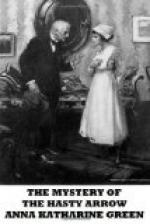This they decided should take the form of a personal interview between certain officials and Mr. Roberts himself. A lesser man would have been asked to meet the District Attorney in his office; but in a case of such moment where the honor of one so prominent in many ways was involved it was thought best for them to visit him in his own home. To do this without exciting his apprehension while still making sure of his presence required some management. Various plans were discussed with the result that a political exigency was brought into play. The District Attorney asked Mr. Roberts for an interview for the purpose of introducing to him a man whose influence could not fail to play an important part in his future candidacy.
He did not name this man; but we will name him. It was the Chief Inspector.
The appointment was made and the day set. It was the following Monday. On Tuesday, Coroner Price was to open his inquest.
Did Carleton Roberts see any connection between these two events?
Who can tell? The secrets of such a brain are not to be read lightly. If we possessed Sweetwater’s interest, and were to follow in secret fashion every action of the director on the evening preceding this date, what conclusion should we draw in this regard? How would we characterize his anticipations, or measure in our own mind the possibilities of the future as felt by him?
He was very quiet. He ate his meal with seeming appetite. Then he took a look over his whole house. From the carefulness with which he noted everything, the changes which he had caused to be made in it were not without their interest for him. Not a young man’s interest, but yet an interest as critical and acute as though he had expected it to be shared by one whose comfort he sought and in whose happiness he would fain take part.
This, to Sweetwater, had he our vision, would have been incomprehensible from any point of view; especially, had he seen what followed when the owner of all this luxury returned to his library.
There was a picture there; a small framed photograph which occupied the post of honor on his desk.
It showed a young and pretty face, untouched, as yet, by the cares or troubles of this world. He spent a minute or so in looking at it; then he slowly lifted it, and taking the picture from the frame, gave it another look, during which a smile almost derisive gathered slowly on his lips. Before this smile had altogether vanished, he had torn the picture in two and thrown the fragments into the fire he had kindled early in the evening with his own hands.
If he stopped to watch these fragments burn, it was from abstraction rather than from interest; for his step grew lighter as he left the fireplace. Whatever this young girl’s face had meant to him in days gone by was now as completely dissipated as the little puff of smoke which had marked the end of her picture.




